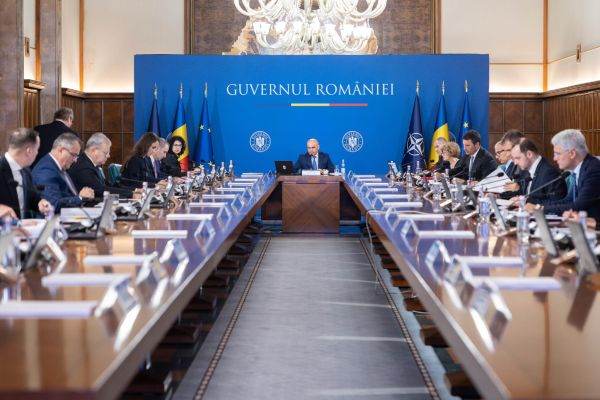The battle that is currently taking place between the executive power - the Government and the judiciary - represented by the Superior Council of Magistracy, on the reform of the magistrates' pension system, resembles a constitutional conflict, as was the one between President Iohannis and the Minister of Justice, when the former head of state initially refused to revoke Laura Codruţa Kovesi from the position of chief prosecutor of the DNA.
Under the threat of losing 231 million euros in funding from the PNRR, if the special pension reform is not adopted by November 28, the Executive is trying to forcefully push through a bill that does not convince anyone, not even those who should approve it. In front of the cameras, Ioana Dogioiu, the Government spokesperson, spoke yesterday about hopes, desires and procedures, but behind the ceremonious statements, it is felt the fear of failure of the current governing coalition and the desperate rush to tick off a milestone in the PNRR that the Executive itself pushed until the last moment.
The project to reform the pension system for magistrates was put into decision-making transparency with suspicious speed, late on Wednesday evening, as if the Government hoped that the details that will profoundly affect the justice system would go unnoticed. Limiting the pension to 70% of the last net salary and increasing the retirement age to 65 seem like measures that will transform one of the most sensitive professional categories into a battlefield between the Government and the CSM. And this confrontation risks throwing Romania off the European calendar at the very moment when the financial stakes are more stringent than ever.
While President Nicuşor Dan sweetens his speech and talks about "flexibility” on the part of the European Commission, the reality is that Brussels no longer looks with indulgence at Romania's delays, and the warning sent by Dragoş Pîslaru, Minister of Investments and European Projects, remains clear: without the special pension law adopted on time, 231 million euros from the PNRR will be lost. Simple, dry, without any nuance.
The Superior Council of Magistracy announced yesterday that its opinion will come next week at the earliest, and the voice of one of the institution's two vice-presidents, Claudiu Sandu, cuts short and cold any hope of the Government: the project submitted by the Bologna Cabinet differs almost nothing from the previous version, declared unconstitutional by the CCR. The magistrates are satisfied with only one element, the extension of the transition period by five years. Otherwise, the differences are cosmetic, and the tension is just as high. Magistrates are demanding 65% of their gross salary, not 55% as the Government wants. They say they are the third power in the state, but they receive the lowest percentage compared to other categories with special pensions. And they are not willing to give up.
Claudiu Sandu also stated that the Government has been stalling for a whole month, and now it is asking the SCM to give its opinion at the speed of light. The document only arrived at the Council yesterday morning, while Government representatives were stating on TV channels that the country risks losing money from the PNRR, if the reform of the retirement system for judges and prosecutors is not adopted quickly. The Vice-President of the SCM announced that the institution in question is not only in no hurry, but also warned that even if it wanted to, the opinion given next week would not change the Government's inability to complete the assumption procedure in Parliament on time.
And, as if the technical dispute were not enough, Claudiu Sandu directly accused the Government of launching a public hate campaign against magistrates. A potentially explosive statement, because it hits a sensitive wound: society's perception of special pensions. The Vice President of the Supreme Administrative Court draws attention to the fact that the very high pensions, the ones that the Government obsessively points to in order to justify budget cuts, are in fact the consequence of its own fiscal policies. The increase in gross income by shifting contributions onto the shoulders of employees has led to huge pensions for some magistrates, but the current project hits not those who are already retired, but those who are still in work and who will have pensions that are even half that of the previous generation. The result? A major rupture within the system: a privileged category, which can no longer be reached, and a future category, forced to work until the age of 65 for an amputated pension. The Vice President of the Supreme Court of Romania states that any person in this situation would react the same way. And this statement takes on special weight in a country where public discourse about magistrates has become a minefield.
Thus, the Romanian political scene is preparing for one of the most tense weeks: The Government is racing against the clock for an opinion without which it risks missing the European milestone; CSM demands respect, time and consistency; the European Commission is watching closely, without guarantees; and citizens are witnessing a new episode in which responsibility is passed from one institution to another, while the real stakes - the modernization of the state and the credibility of Romania - are left to chance.
And yet, in all this game of pressure, procrastination and mutual accusations, one thing becomes obvious: the Government underestimated the magnitude of the front it has opened. And now, as the clock ticks relentlessly towards November 28, no discourse about hope and desire can hide the fact that Romania is one step away from a major failure that it will no longer have anyone to blame.













































